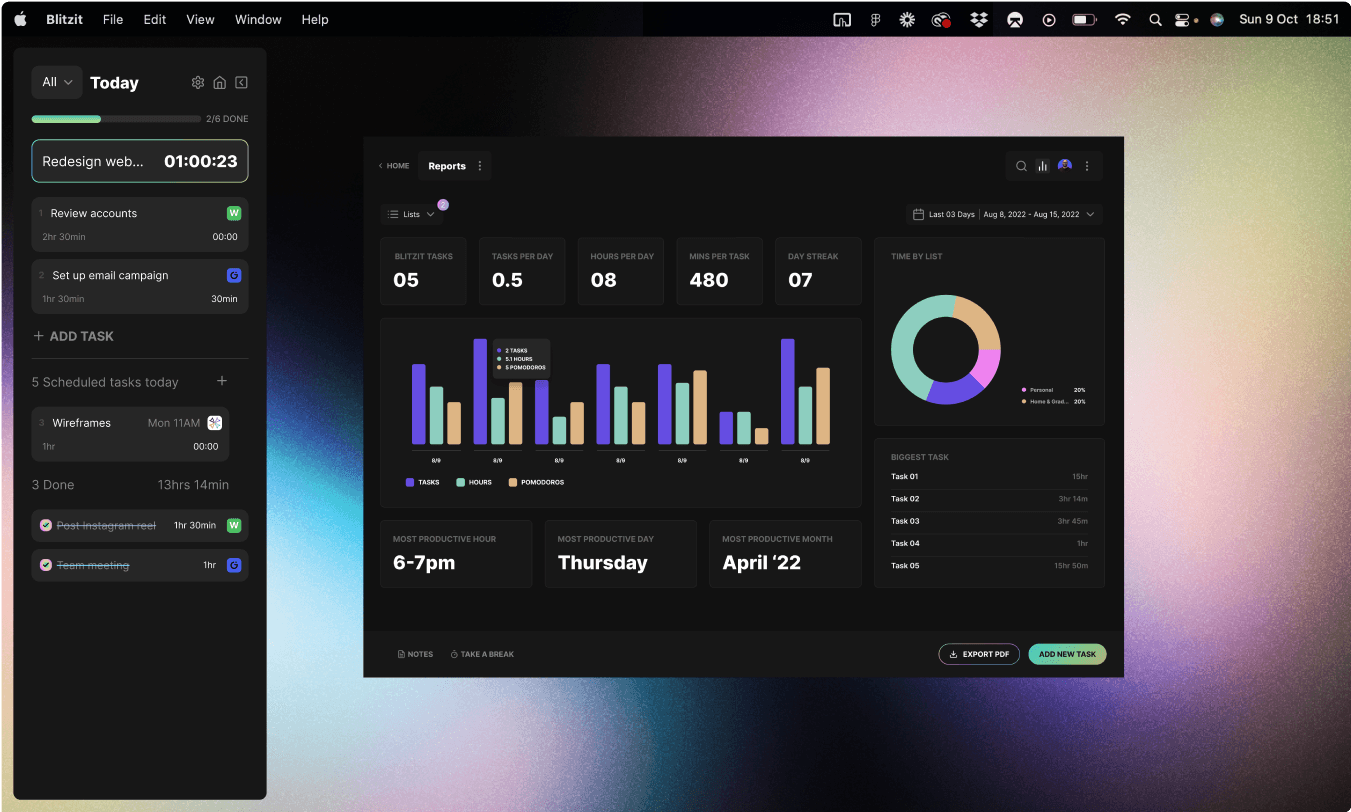Feeling overwhelmed by your to-do list? You’re not alone. Effective time management is a vital skill for keeping stress at bay by giving you clarity and control over your day. By focusing on what truly matters and breaking tasks into manageable steps—and with tools like Blitzit to help you prioritize—you can avoid the last-minute chaos that often leads to anxiety.
This proactive approach boosts your productivity and nurtures a calmer, more fulfilling life. Let’s explore how honing your time management skills can significantly reduce stress.
Understanding Time Management
Time management involves organizing your tasks effectively to maximize productivity and minimize stress. It allows you to focus on what truly matters.
Definition and Importance
Time management refers to the process of planning and controlling how much time you spend on specific activities. By managing time well, you ensure that your most important tasks receive adequate attention.
Prioritizing tasks not only boosts productivity but also enhances your ability to meet deadlines. This skill eventually leads to improved work-life balance and greater satisfaction in both personal and professional life.
The Relationship Between Time Management and Stress
Effective time management significantly reduces stress levels. When you prioritize tasks, you gain clarity on what requires immediate attention. This clarity prevents the overwhelm of last-minute rushes and chaotic schedules.
Also, managing your time allows for better control over your commitments and obligations. When you use time management techniques, you diminish feelings of anxiety and fatigue, fostering a calmer and more productive environment.
Strategies for Effective Time Management
Effective time management reduces stress by optimizing how you handle your tasks. Implementing key strategies enables you to focus on what matters most.
Prioritizing Tasks
Prioritizing tasks is essential for minimizing stress. Identify tasks based on urgency and importance, using tools like the Eisenhower Matrix. This matrix allows you to categorize tasks into four quadrants, helping you allocate your time effectively.
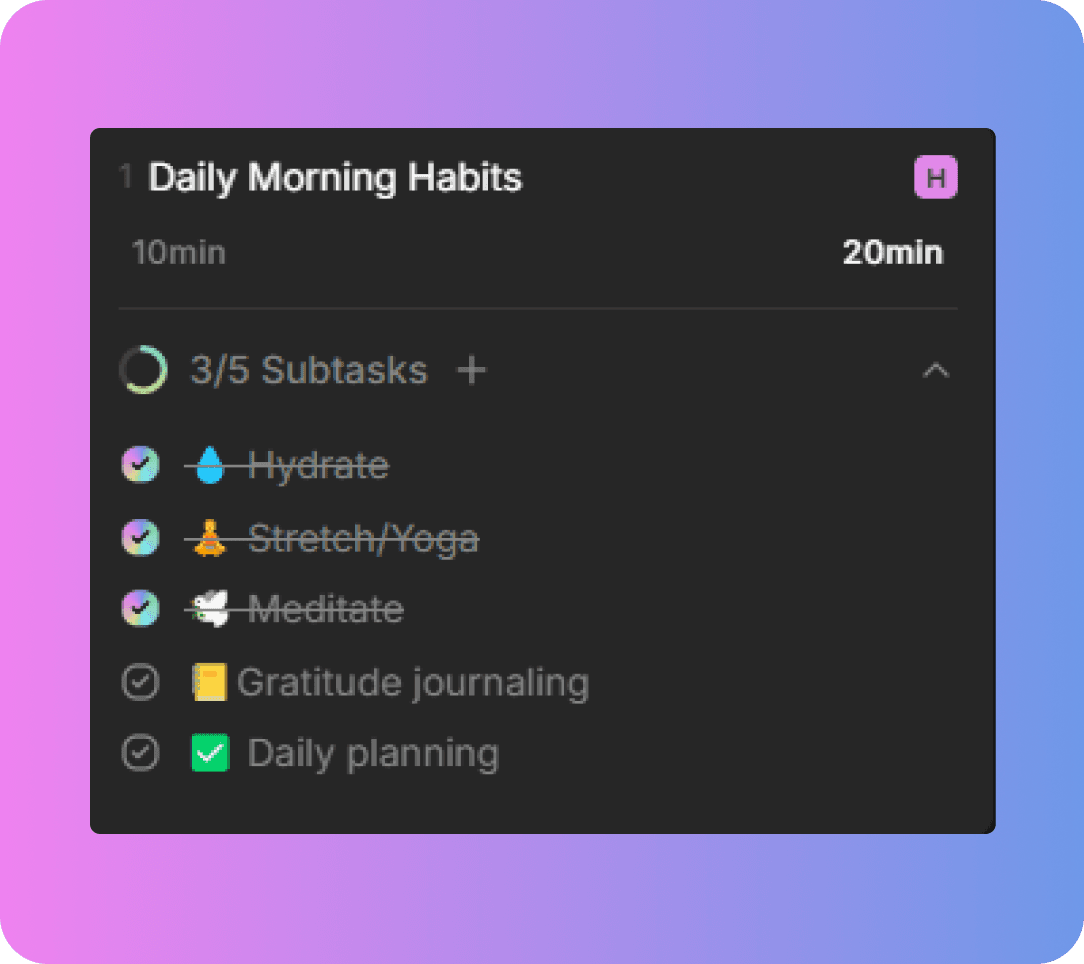
Focus first on the high-priority items, ensuring critical deadlines are met and reducing last-minute panic.
Cut down on stress by having a clear to-do plan.
Ensure urgent tasks are completed on time.
Enhance decision-making by weighing task importance.
Planning and Scheduling
Planning and scheduling tasks provide a structured approach to managing time. Break larger projects into smaller, actionable steps, listing them in order of completion. Identify dependencies that could cause bottlenecks and adjust your schedule accordingly. Use tools like day planners, sticky notes, or project management software to visualize your tasks and track progress.
Develop a detailed understanding of task steps.
Write steps down to create a clear workflow.
Track each step's execution for better efficiency.
How Blitzit Can Help
Blitzit enhances your time management through its intuitive to-do list and timer features. Organize tasks into prioritized columns, allowing you to focus on the most critical items first. Blitzit's blitz mode, or focus session, eliminates distractions and fosters a flow state, enabling you to work efficiently. Setting realistic task time estimates helps you allocate your time effectively while ensuring you stay on track.
Maximize productivity by prioritizing tasks in Blitzit.
Remove distractions with focused work sessions.
Track time to improve your task completion rate.
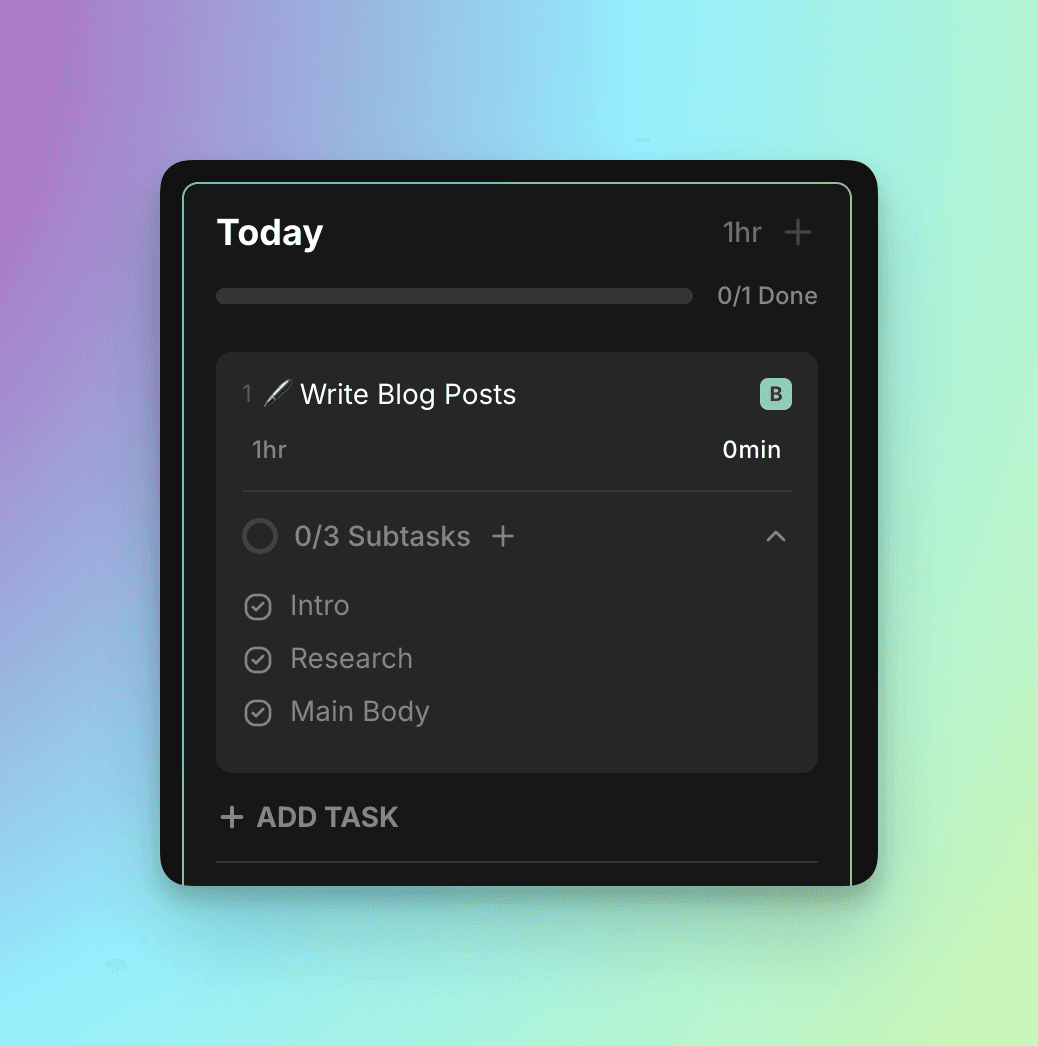
Time Management Techniques to Reduce Stress
Effective time management techniques play a vital role in reducing stress. They help you maintain focus, increase productivity, and improve your overall well-being. Tools like Blitzit make implementing these strategies simpler by offering features that help you organize and prioritize tasks seamlessly.
The Pomodoro Method
The Pomodoro Method involves working in focused 25-minute intervals, known as "pomodoros," followed by a 5-minute break. After completing four pomodoros, take a longer break of 15–30 minutes. This method enhances focus, minimizes procrastination, and ensures regular breaks to recharge.
Using a tool like Blitzit’s floating timer, you can easily track your work sessions and breaks without disrupting your flow. By breaking tasks into manageable segments, you'll find it easier to start and complete them, leading to reduced stress and increased productivity.
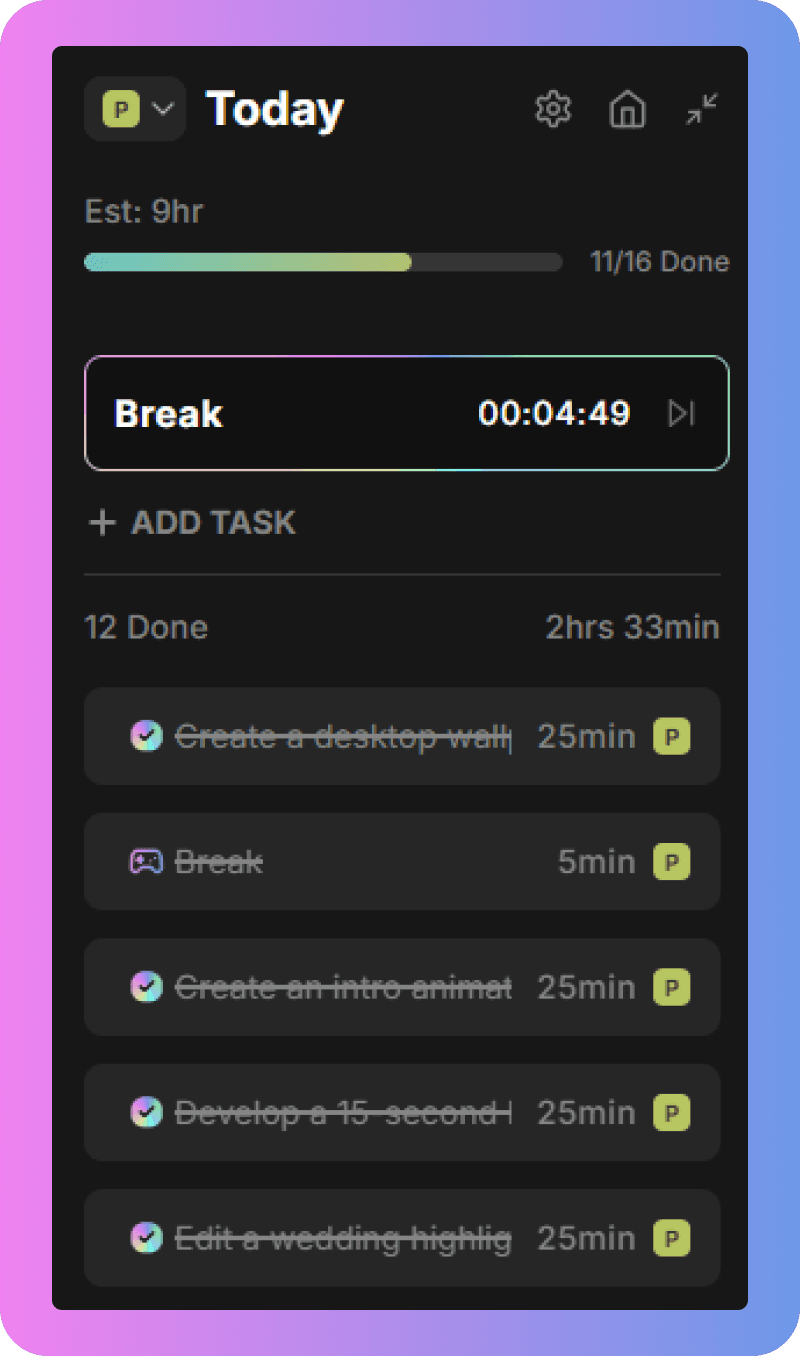
Time Blocking
Time blocking divides your day into specific time slots for tasks, helping you focus on one thing at a time and avoid multitasking. It’s a simple yet powerful way to boost productivity and reduce stress.
With Blitzit, this technique becomes easier to manage. You can set Task Time Estimates (EST) for each block, ensuring you allocate realistic timeframes to complete tasks. Prioritize your work by organizing tasks into list columns and easily adjust your plan by dragging and dropping tasks between columns.
You can also schedule breaks within these blocks, ensuring a balanced workflow and reducing feelings of overwhelm.
Delegating Responsibilities
Delegating responsibilities is crucial for maintaining a manageable workload. Assign tasks to team members based on their strengths, freeing you to focus on high-priority items. This strategy minimizes stress by reducing the burden on your shoulders.
A supportive team culture enhances collaboration, boosts morale, and keeps energy levels high, especially during demanding periods. By effectively sharing tasks, you foster a more productive environment and maintain your mental well-being.
The Impact of Poor Time Management on Stress Levels
Poor time management significantly increases stress levels. Recognizing its impact can help you identify areas for improvement and take actionable steps.
Common Indicators of Poor Management
Disorganization that leads to inefficiency.
Missed deadlines and a constant state of overwhelm.
Inability to prioritize important tasks due to lack of structure.
Difficulty saying no, resulting in overcommitment.
Procrastination that causes tasks to pile up, increasing stress.
Frequent distractions interrupting your workflow and focus.
Mental and Physical Health Consequences
Increased irritability, anxiety, and fatigue.
Headaches and muscle tension caused by heightened stress levels.
Feelings of disengagement and burnout from overwhelming workloads.
Decreased overall well-being due to constant pressure.
Benefits of Effective Time Management
Effective time management leads to significant reductions in stress levels, promoting a more organized and fulfilling life.
Enhanced Work-Life Balance
Effective time management helps you allocate sufficient time for both work and personal activities. By prioritizing essential tasks and scheduling breaks, you enjoy your personal life without feeling overwhelmed.

A well-structured schedule allows you to meet professional obligations while still making time for family, hobbies, and relaxation. Balancing these elements ensures you recharge, preventing burnout and fostering a healthier lifestyle.
Increased Productivity
Effective time management directly boosts your productivity. By setting clear, achievable goals and breaking tasks into manageable steps, you minimize procrastination. Using tools like prioritized to-do lists and timers enhances focus, leading to quicker completion of tasks.

A well-managed schedule eliminates unnecessary distractions, allowing you to dive deep into work and maintain a flow state, which maximizes output and efficiency throughout your day.
Improved Mental Well-being
Effective time management contributes significantly to improved mental well-being. Organized schedules reduce anxiety by providing clarity on priorities and tasks ahead. By allocating time for rest, work, and leisure, you foster a healthier mind and body.

Regularly managing your time allows for active coping strategies against stress. The sense of accomplishment from completing tasks further promotes positivity and boosts self-esteem. Eventually, better mental well-being leads to a more productive and satisfying life.
Conclusion
Mastering time management is a game-changer for reducing stress and enhancing your overall well-being. By prioritizing tasks and breaking down your workload, you can take control of your day and minimize feelings of overwhelm. Implementing techniques like the Pomodoro Method and time blocking helps you stay focused and productive while creating space for relaxation.
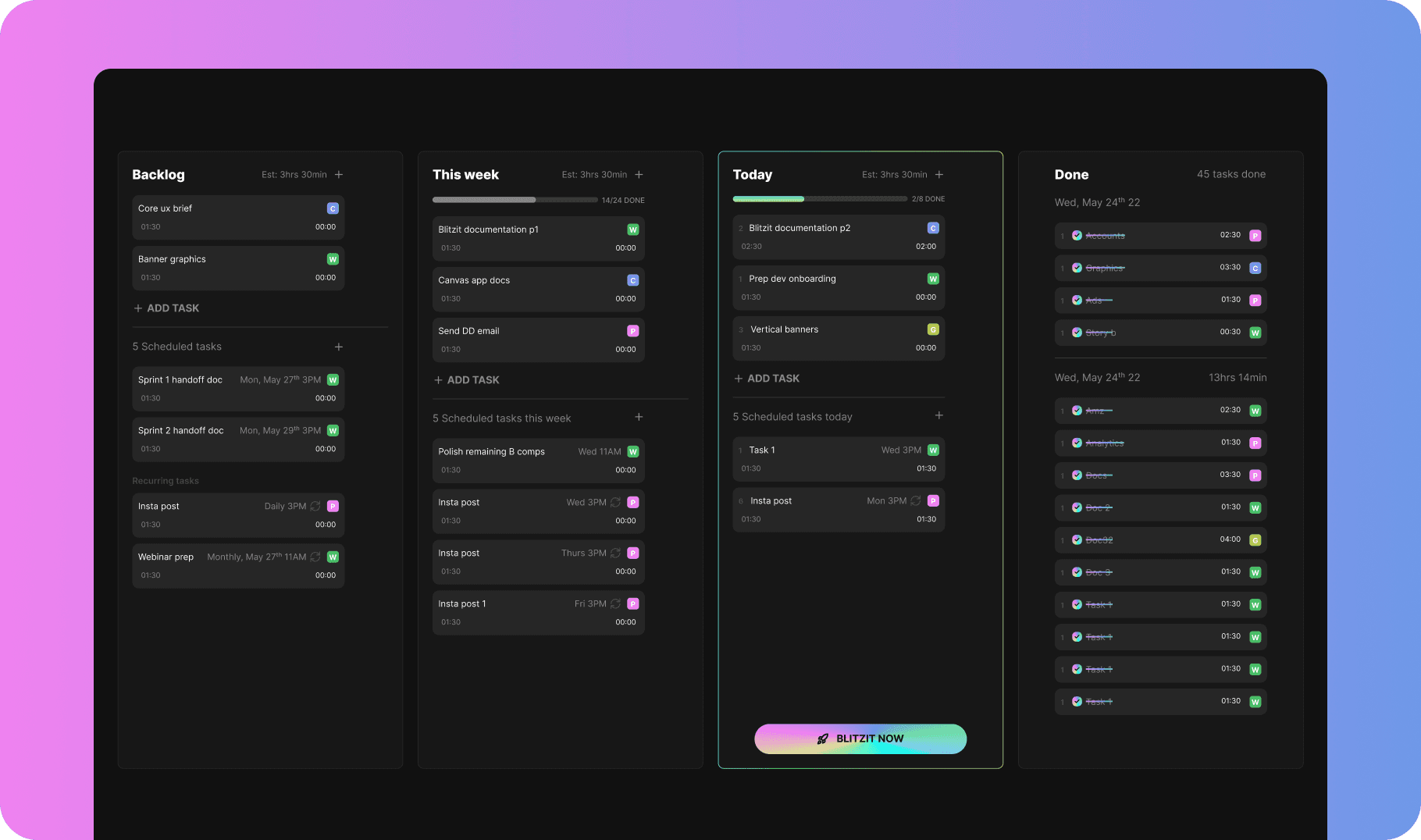
Utilizing tools like Blitzit can further streamline your efforts, allowing you to visualize your tasks and stay organized. As you develop these skills, you’ll find that stress diminishes and your quality of life improves. Embrace effective time management, and watch as you transform your daily routine into a more peaceful and satisfying experience.
Feeling overwhelmed by your to-do list? You’re not alone. Effective time management is a vital skill for keeping stress at bay by giving you clarity and control over your day. By focusing on what truly matters and breaking tasks into manageable steps—and with tools like Blitzit to help you prioritize—you can avoid the last-minute chaos that often leads to anxiety.
This proactive approach boosts your productivity and nurtures a calmer, more fulfilling life. Let’s explore how honing your time management skills can significantly reduce stress.
Understanding Time Management
Time management involves organizing your tasks effectively to maximize productivity and minimize stress. It allows you to focus on what truly matters.
Definition and Importance
Time management refers to the process of planning and controlling how much time you spend on specific activities. By managing time well, you ensure that your most important tasks receive adequate attention.
Prioritizing tasks not only boosts productivity but also enhances your ability to meet deadlines. This skill eventually leads to improved work-life balance and greater satisfaction in both personal and professional life.
The Relationship Between Time Management and Stress
Effective time management significantly reduces stress levels. When you prioritize tasks, you gain clarity on what requires immediate attention. This clarity prevents the overwhelm of last-minute rushes and chaotic schedules.
Also, managing your time allows for better control over your commitments and obligations. When you use time management techniques, you diminish feelings of anxiety and fatigue, fostering a calmer and more productive environment.
Strategies for Effective Time Management
Effective time management reduces stress by optimizing how you handle your tasks. Implementing key strategies enables you to focus on what matters most.
Prioritizing Tasks
Prioritizing tasks is essential for minimizing stress. Identify tasks based on urgency and importance, using tools like the Eisenhower Matrix. This matrix allows you to categorize tasks into four quadrants, helping you allocate your time effectively.

Focus first on the high-priority items, ensuring critical deadlines are met and reducing last-minute panic.
Cut down on stress by having a clear to-do plan.
Ensure urgent tasks are completed on time.
Enhance decision-making by weighing task importance.
Planning and Scheduling
Planning and scheduling tasks provide a structured approach to managing time. Break larger projects into smaller, actionable steps, listing them in order of completion. Identify dependencies that could cause bottlenecks and adjust your schedule accordingly. Use tools like day planners, sticky notes, or project management software to visualize your tasks and track progress.
Develop a detailed understanding of task steps.
Write steps down to create a clear workflow.
Track each step's execution for better efficiency.
How Blitzit Can Help
Blitzit enhances your time management through its intuitive to-do list and timer features. Organize tasks into prioritized columns, allowing you to focus on the most critical items first. Blitzit's blitz mode, or focus session, eliminates distractions and fosters a flow state, enabling you to work efficiently. Setting realistic task time estimates helps you allocate your time effectively while ensuring you stay on track.
Maximize productivity by prioritizing tasks in Blitzit.
Remove distractions with focused work sessions.
Track time to improve your task completion rate.

Time Management Techniques to Reduce Stress
Effective time management techniques play a vital role in reducing stress. They help you maintain focus, increase productivity, and improve your overall well-being. Tools like Blitzit make implementing these strategies simpler by offering features that help you organize and prioritize tasks seamlessly.
The Pomodoro Method
The Pomodoro Method involves working in focused 25-minute intervals, known as "pomodoros," followed by a 5-minute break. After completing four pomodoros, take a longer break of 15–30 minutes. This method enhances focus, minimizes procrastination, and ensures regular breaks to recharge.
Using a tool like Blitzit’s floating timer, you can easily track your work sessions and breaks without disrupting your flow. By breaking tasks into manageable segments, you'll find it easier to start and complete them, leading to reduced stress and increased productivity.

Time Blocking
Time blocking divides your day into specific time slots for tasks, helping you focus on one thing at a time and avoid multitasking. It’s a simple yet powerful way to boost productivity and reduce stress.
With Blitzit, this technique becomes easier to manage. You can set Task Time Estimates (EST) for each block, ensuring you allocate realistic timeframes to complete tasks. Prioritize your work by organizing tasks into list columns and easily adjust your plan by dragging and dropping tasks between columns.
You can also schedule breaks within these blocks, ensuring a balanced workflow and reducing feelings of overwhelm.
Delegating Responsibilities
Delegating responsibilities is crucial for maintaining a manageable workload. Assign tasks to team members based on their strengths, freeing you to focus on high-priority items. This strategy minimizes stress by reducing the burden on your shoulders.
A supportive team culture enhances collaboration, boosts morale, and keeps energy levels high, especially during demanding periods. By effectively sharing tasks, you foster a more productive environment and maintain your mental well-being.
The Impact of Poor Time Management on Stress Levels
Poor time management significantly increases stress levels. Recognizing its impact can help you identify areas for improvement and take actionable steps.
Common Indicators of Poor Management
Disorganization that leads to inefficiency.
Missed deadlines and a constant state of overwhelm.
Inability to prioritize important tasks due to lack of structure.
Difficulty saying no, resulting in overcommitment.
Procrastination that causes tasks to pile up, increasing stress.
Frequent distractions interrupting your workflow and focus.
Mental and Physical Health Consequences
Increased irritability, anxiety, and fatigue.
Headaches and muscle tension caused by heightened stress levels.
Feelings of disengagement and burnout from overwhelming workloads.
Decreased overall well-being due to constant pressure.
Benefits of Effective Time Management
Effective time management leads to significant reductions in stress levels, promoting a more organized and fulfilling life.
Enhanced Work-Life Balance
Effective time management helps you allocate sufficient time for both work and personal activities. By prioritizing essential tasks and scheduling breaks, you enjoy your personal life without feeling overwhelmed.

A well-structured schedule allows you to meet professional obligations while still making time for family, hobbies, and relaxation. Balancing these elements ensures you recharge, preventing burnout and fostering a healthier lifestyle.
Increased Productivity
Effective time management directly boosts your productivity. By setting clear, achievable goals and breaking tasks into manageable steps, you minimize procrastination. Using tools like prioritized to-do lists and timers enhances focus, leading to quicker completion of tasks.

A well-managed schedule eliminates unnecessary distractions, allowing you to dive deep into work and maintain a flow state, which maximizes output and efficiency throughout your day.
Improved Mental Well-being
Effective time management contributes significantly to improved mental well-being. Organized schedules reduce anxiety by providing clarity on priorities and tasks ahead. By allocating time for rest, work, and leisure, you foster a healthier mind and body.

Regularly managing your time allows for active coping strategies against stress. The sense of accomplishment from completing tasks further promotes positivity and boosts self-esteem. Eventually, better mental well-being leads to a more productive and satisfying life.
Conclusion
Mastering time management is a game-changer for reducing stress and enhancing your overall well-being. By prioritizing tasks and breaking down your workload, you can take control of your day and minimize feelings of overwhelm. Implementing techniques like the Pomodoro Method and time blocking helps you stay focused and productive while creating space for relaxation.

Utilizing tools like Blitzit can further streamline your efforts, allowing you to visualize your tasks and stay organized. As you develop these skills, you’ll find that stress diminishes and your quality of life improves. Embrace effective time management, and watch as you transform your daily routine into a more peaceful and satisfying experience.
Feeling overwhelmed by your to-do list? You’re not alone. Effective time management is a vital skill for keeping stress at bay by giving you clarity and control over your day. By focusing on what truly matters and breaking tasks into manageable steps—and with tools like Blitzit to help you prioritize—you can avoid the last-minute chaos that often leads to anxiety.
This proactive approach boosts your productivity and nurtures a calmer, more fulfilling life. Let’s explore how honing your time management skills can significantly reduce stress.
Understanding Time Management
Time management involves organizing your tasks effectively to maximize productivity and minimize stress. It allows you to focus on what truly matters.
Definition and Importance
Time management refers to the process of planning and controlling how much time you spend on specific activities. By managing time well, you ensure that your most important tasks receive adequate attention.
Prioritizing tasks not only boosts productivity but also enhances your ability to meet deadlines. This skill eventually leads to improved work-life balance and greater satisfaction in both personal and professional life.
The Relationship Between Time Management and Stress
Effective time management significantly reduces stress levels. When you prioritize tasks, you gain clarity on what requires immediate attention. This clarity prevents the overwhelm of last-minute rushes and chaotic schedules.
Also, managing your time allows for better control over your commitments and obligations. When you use time management techniques, you diminish feelings of anxiety and fatigue, fostering a calmer and more productive environment.
Strategies for Effective Time Management
Effective time management reduces stress by optimizing how you handle your tasks. Implementing key strategies enables you to focus on what matters most.
Prioritizing Tasks
Prioritizing tasks is essential for minimizing stress. Identify tasks based on urgency and importance, using tools like the Eisenhower Matrix. This matrix allows you to categorize tasks into four quadrants, helping you allocate your time effectively.

Focus first on the high-priority items, ensuring critical deadlines are met and reducing last-minute panic.
Cut down on stress by having a clear to-do plan.
Ensure urgent tasks are completed on time.
Enhance decision-making by weighing task importance.
Planning and Scheduling
Planning and scheduling tasks provide a structured approach to managing time. Break larger projects into smaller, actionable steps, listing them in order of completion. Identify dependencies that could cause bottlenecks and adjust your schedule accordingly. Use tools like day planners, sticky notes, or project management software to visualize your tasks and track progress.
Develop a detailed understanding of task steps.
Write steps down to create a clear workflow.
Track each step's execution for better efficiency.
How Blitzit Can Help
Blitzit enhances your time management through its intuitive to-do list and timer features. Organize tasks into prioritized columns, allowing you to focus on the most critical items first. Blitzit's blitz mode, or focus session, eliminates distractions and fosters a flow state, enabling you to work efficiently. Setting realistic task time estimates helps you allocate your time effectively while ensuring you stay on track.
Maximize productivity by prioritizing tasks in Blitzit.
Remove distractions with focused work sessions.
Track time to improve your task completion rate.

Time Management Techniques to Reduce Stress
Effective time management techniques play a vital role in reducing stress. They help you maintain focus, increase productivity, and improve your overall well-being. Tools like Blitzit make implementing these strategies simpler by offering features that help you organize and prioritize tasks seamlessly.
The Pomodoro Method
The Pomodoro Method involves working in focused 25-minute intervals, known as "pomodoros," followed by a 5-minute break. After completing four pomodoros, take a longer break of 15–30 minutes. This method enhances focus, minimizes procrastination, and ensures regular breaks to recharge.
Using a tool like Blitzit’s floating timer, you can easily track your work sessions and breaks without disrupting your flow. By breaking tasks into manageable segments, you'll find it easier to start and complete them, leading to reduced stress and increased productivity.

Time Blocking
Time blocking divides your day into specific time slots for tasks, helping you focus on one thing at a time and avoid multitasking. It’s a simple yet powerful way to boost productivity and reduce stress.
With Blitzit, this technique becomes easier to manage. You can set Task Time Estimates (EST) for each block, ensuring you allocate realistic timeframes to complete tasks. Prioritize your work by organizing tasks into list columns and easily adjust your plan by dragging and dropping tasks between columns.
You can also schedule breaks within these blocks, ensuring a balanced workflow and reducing feelings of overwhelm.
Delegating Responsibilities
Delegating responsibilities is crucial for maintaining a manageable workload. Assign tasks to team members based on their strengths, freeing you to focus on high-priority items. This strategy minimizes stress by reducing the burden on your shoulders.
A supportive team culture enhances collaboration, boosts morale, and keeps energy levels high, especially during demanding periods. By effectively sharing tasks, you foster a more productive environment and maintain your mental well-being.
The Impact of Poor Time Management on Stress Levels
Poor time management significantly increases stress levels. Recognizing its impact can help you identify areas for improvement and take actionable steps.
Common Indicators of Poor Management
Disorganization that leads to inefficiency.
Missed deadlines and a constant state of overwhelm.
Inability to prioritize important tasks due to lack of structure.
Difficulty saying no, resulting in overcommitment.
Procrastination that causes tasks to pile up, increasing stress.
Frequent distractions interrupting your workflow and focus.
Mental and Physical Health Consequences
Increased irritability, anxiety, and fatigue.
Headaches and muscle tension caused by heightened stress levels.
Feelings of disengagement and burnout from overwhelming workloads.
Decreased overall well-being due to constant pressure.
Benefits of Effective Time Management
Effective time management leads to significant reductions in stress levels, promoting a more organized and fulfilling life.
Enhanced Work-Life Balance
Effective time management helps you allocate sufficient time for both work and personal activities. By prioritizing essential tasks and scheduling breaks, you enjoy your personal life without feeling overwhelmed.

A well-structured schedule allows you to meet professional obligations while still making time for family, hobbies, and relaxation. Balancing these elements ensures you recharge, preventing burnout and fostering a healthier lifestyle.
Increased Productivity
Effective time management directly boosts your productivity. By setting clear, achievable goals and breaking tasks into manageable steps, you minimize procrastination. Using tools like prioritized to-do lists and timers enhances focus, leading to quicker completion of tasks.

A well-managed schedule eliminates unnecessary distractions, allowing you to dive deep into work and maintain a flow state, which maximizes output and efficiency throughout your day.
Improved Mental Well-being
Effective time management contributes significantly to improved mental well-being. Organized schedules reduce anxiety by providing clarity on priorities and tasks ahead. By allocating time for rest, work, and leisure, you foster a healthier mind and body.

Regularly managing your time allows for active coping strategies against stress. The sense of accomplishment from completing tasks further promotes positivity and boosts self-esteem. Eventually, better mental well-being leads to a more productive and satisfying life.
Conclusion
Mastering time management is a game-changer for reducing stress and enhancing your overall well-being. By prioritizing tasks and breaking down your workload, you can take control of your day and minimize feelings of overwhelm. Implementing techniques like the Pomodoro Method and time blocking helps you stay focused and productive while creating space for relaxation.

Utilizing tools like Blitzit can further streamline your efforts, allowing you to visualize your tasks and stay organized. As you develop these skills, you’ll find that stress diminishes and your quality of life improves. Embrace effective time management, and watch as you transform your daily routine into a more peaceful and satisfying experience.



